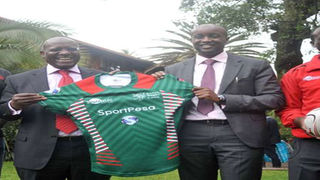
Then Kenya Sevens rugby head coach Innocent Simiyu (left), SportPesa CEO Ronald Karauri, KRU boss Richard Omwela and Lionesses coach Kevin Wambua display the national team jersey at Norfolk on November 22, 2016.
| Chris Omollo | Nation Media GroupRugby
Premium
SportPesa to pay Kenya Rugby Union Sh417m after botched deal
What you need to know:
- Two years ago, SportPesa terminated all sponsorship deals it had signed with local federations and teams following a standoff with the government.
- SportPesa pulled out of all its sponsorship deals after the National Assembly introduced a 35 per cent tax on all revenue generated by betting firms.
Troubled betting firm SportPesa has been directed to pay the Kenya Rugby Union (KRU) Sh417 million over a terminated sponsorship deal.
The order arising from arbitration is likely to open the door for other sports federations and teams to pursue the betting giant for more cash.
KRU has now asked the High Court to adopt Dr Wilfred Mutubwa’s judgment as a court order, which could allow the rugby federation to attach Sportpesa’s assets to recover the award.
Dr Mutubwa’s decision could spark several claims against SportPesa, given the betting giant issued similar termination notices to other federations and teams it sponsored.
Termination notice
In the February 2021 judgment, Dr Mutubwa agreed with the KRU that the sponsorship termination notice was not in accordance with the contract signed between the two parties.
He then went ahead to award the rugby federation the Sh417 million balance from the deal.
The matter went for arbitration after the rugby federation raised a dispute regarding the manner in which the gaming firm terminated the sponsorship deal.
Two years ago, SportPesa terminated all sponsorship deals it had signed with local federations and teams following a standoff with the government, which the betting firm said had ruined its operations and profitability.
SportPesa pulled out of all its sponsorship deals after the National Assembly introduced a 35 per cent tax on all revenue generated by betting firms.
The move was largely seen as a ploy by the gaming company to arm-twist the government into dropping the new levies.





